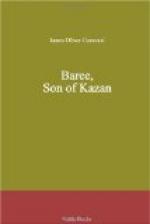She sat in the firelight, leaning a little toward the blaze, her wonderful hair warmly reflecting its mellow light. Carvel did not move while she was in that attitude. He seemed scarcely to breathe. The glow in his eyes grew deeper—the worship of a man for a woman. Suddenly Nepeese turned and caught him before he could turn his gaze. There was nothing to hide in her own eyes. Like her face, they were alight with a new hope and a new gladness. Carvel sat down beside her on the birch log, and in his hand he took one of her thick braids and crumpled it as he talked. At their feet, watching them, lay Baree.
“Tomorrow or the next day I am going to Lac Bain,” he said, a hard and bitter note back of the gentle worship in his voice. “I will not come back until I have—killed him.”
The Willow looked straight into the fire. For a time there was a silence broken only by the crackling of the flames, and in that silence Carvel’s fingers weaved in and out of the silken strands of the Willow’s hair. His thoughts flashed back. What a chance he had missed that day on Bush McTaggart’s trap line—if he had only known! His jaws set hard as he saw in the red-hot heart of the fire the mental pictures of the day when the factor from Lac Bain had killed Pierrot. She had told him the whole story. Her flight. Her plunge to what she had thought was certain death in the icy torrent of the chasm. Her miraculous escape from the waters—and how she was discovered, nearly dead, by Tuboa, the toothless old Cree whom Pierrot out of pity had allowed to hunt in part of his domain. He felt within himself the tragedy and the horror of the one terrible hour in which the sun had gone out of the world for the Willow, and in the flames he could see faithful old Tuboa as he called on his last strength to bear Nepeese over the long miles that lay between the chasm and his cabin. He caught shifting visions of the weeks that followed in that cabin, weeks of hunger and of intense cold in which the Willow’s life hung by a single thread. And at last, when the snows were deepest, Tuboa had died. Carvel’s fingers clenched in the strands of the Willow’s braid. A deep breath rose out of his chest, and he said, staring deep into the fire,
“Tomorrow I will go to Lac Bain.”
For a moment Nepeese did not answer. She, too, was looking into the fire. Then she said:
“Tuboa meant to kill him when the spring came, and he could travel. When Tuboa died I knew that it was I who must kill him. So I came, with Tuboa’s gun. It was fresh loaded—yesterday. And—M’sieu Jeem”—she looked up at him, a triumphant glow in her eyes as she added, almost in a whisper—“You will not go to Lac Bain. I have sent A messenger.”
“A messenger?”
“Yes, Ookimow Jeem—a messenger. Two days ago. I sent word that I had not died, but was here—waiting for him—and that I would be Iskwao now, his wife. Oo-oo, he will come, Ookimow Jeem—he will come fast. And you shall not kill him. Non!” She smiled into his face, and the throb of Carvel’s heart was like a drum. “The gun is loaded,” she said softly. “I will shoot.”




